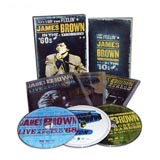|
James Brown
I Got the Feelin' --- James Brown in the 60's
Shout Factory |

Forty
years ago this past April, Martin Luther King, Jr.
was assassinated in Memphis. For those who weren’t
around at the time, the country sat on the edge of
turmoil in the wake of this senseless murder. There
was widespread rioting in most of the major cities
in the U.S., houses and businesses were burned and
looted, and more deaths ensued.
One city
that was spared much of the violence or damage was
Boston, but it could have easily gone the other way
but for a few fortunate events. The most fortuitous
was a concert that had been scheduled for Boston
Garden on April 5, 1968, the day after King was
killed. The main attraction was Soul Brother Number
One, James Brown.
Though
Brown has always been regarded as one of the
pioneers of soul and funk music, few realize the
impact he had on the black community. A staunch
supporter of Civil Rights, Brown stressed self-help
within the black community, through education
achievement and personal improvement. For Brown,
this concept was a no-brainer, for he
single-handedly rose above a rough childhood,
including a stint in prison, and became one of the
most successful and prosperous artists of the ’60s
and ’70s. Brown earned the nickname, “Hardest
Working Man In Show Business,” as much by pouring
his heart into every performance as by controlling
all of the behind-the-scenes operations involving
his business.
At
first, the thought was to cancel the concert, but
many of the city fathers felt that this would only
ignite an already tense situation. Finally, Brown
agreed to do the performance. It was an excellent
performance and gave the enthusiastic audience an
opportunity to work off some steam and tension.
Near the
end of the performance, some of the excited crowd
rushed the stage and were initially restrained
politely by security, but as things progressed, one
white security officer threw a black audience member
back into the crowd, which nearly incited a riot.
Brown coolly stopped the show, and gently admonished
the audience, settling them down and also letting
the security forces know that he had the situation
under control, an amazing feat given the events of
the past couple of days.
The
decision was made at the time to televise the
concert as well, so the event not only reached the
15,000 or so in attendance, but also millions in the
city who were unable to attend but could watch it on
TV. The concert went over so well that it was
immediately repeated on all the Boston TV stations
and the radio.
Shout!
Factory has released this concert in its entirety,
along with additional performances from the same
period (Brown appeared at the Apollo the week before
King’s death), plus other features in the wonderful
DVD compilation, I Got The Feelin’ – James Brown
in the 60’s.
The set
consists of three DVDs, the Boston Garden concert,
an appearance from late March at the Apollo, and the
recent VH-1 documentary called The Night James
Brown Saved Boston. The documentary is a
compelling mix of vintage footage and recent
interviews with some of the principles, including
band members, attendees, personal manager Charles
Bobbit, who worked with Brown for 40 years, former
mayor Kevin White and others like Rev. Al Sharpton,
Dr. Cornel West, and music historian Rickey Vincent.
To a man, they all agree that it was not only a
phenomenal musical performance, but also an
extraordinary example of an artist using his gifts
to make the best of a difficult situation.
The
performance at the Boston Garden ranks as one of
Brown’s best. Filmed in black and white, there are a
few video gaps at the beginning, but not enough that
you don’t catch the feel of the performance. Wisely,
Brown didn’t vary a bit from his usual act, carrying
on his usual banter with his band and the audience
as if nothing was out of the ordinary. The band,
which featured Brown stalwarts like Maceo Parker,
Jimmy Nolen, Alfred “Pee Wee” Ellis, St. Clair
Pinckney, Fred Wesley, and Clyde Stubblefield, was,
as always, incredible.
The
performance at the Apollo was filmed in color.
Interspersed with the performances are scenes of
Brown walking through dilapidated areas of Harlem,
During these scenes, a weary Brown (he was exhausted
from nonstop touring and distraught over the recent
death of blues singer and Brown mentor Little Willie
John a few months earlier) states his mission: “My
fight now is for the Black America…..to become
American.” The set list is almost identical to the
Boston Garden’s, but the performances are just as
incendiary.
Fans of
James Brown will definitely want to add this set to
their collection, but it deserves a spot in any real
music fan’s library.
---
Graham Clarke
|